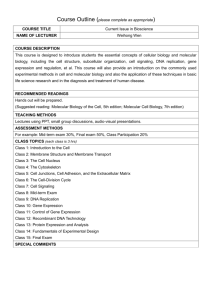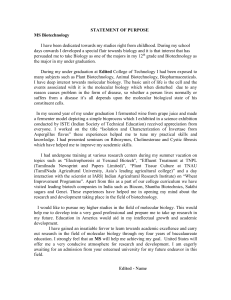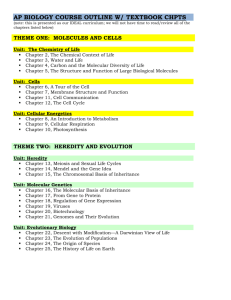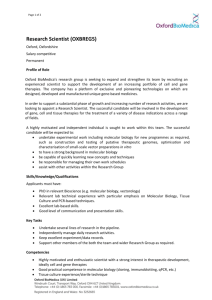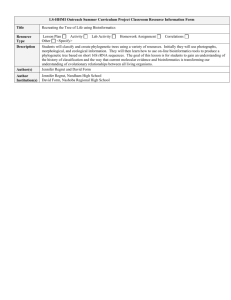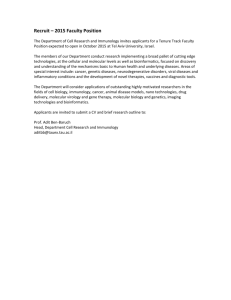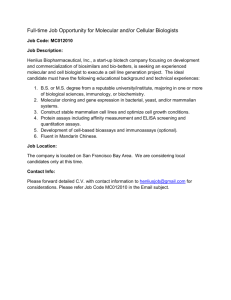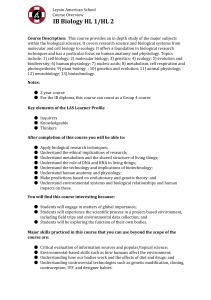Biotechnology Biotechnology, Bioinformatics, Bioscience Business
advertisement
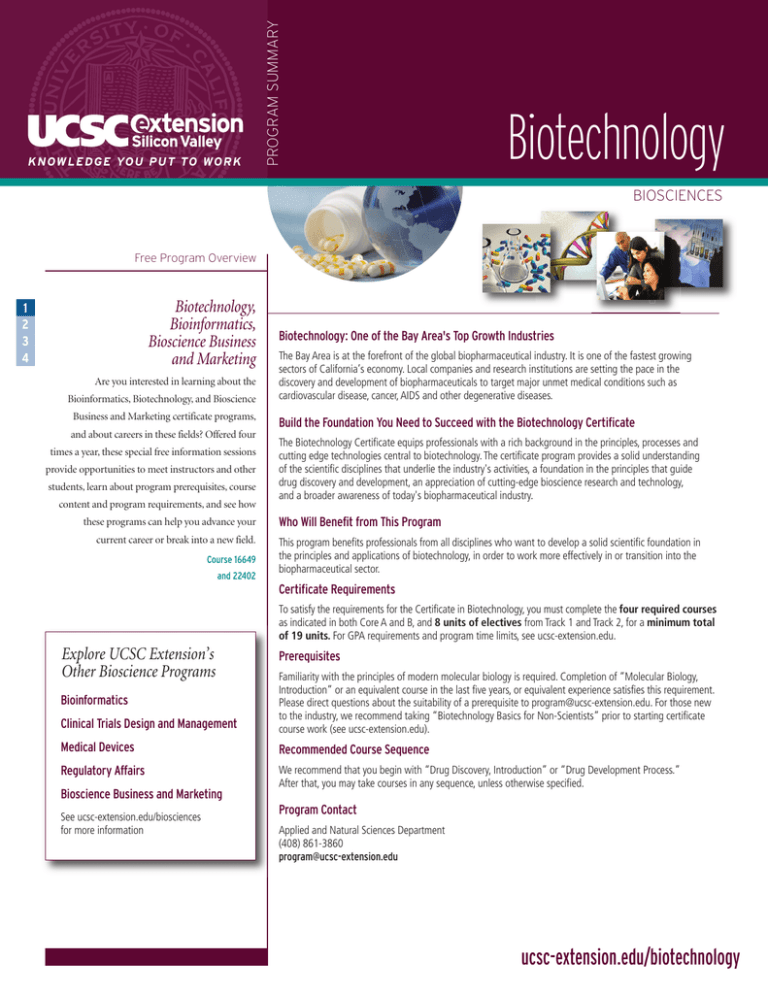
PROGRAM SUMMARY K NOW LED G E YOU PUT TO WORK Biotechnology BIOSCIENCES Free Program Overview Biotechnology, Bioinformatics, Bioscience Business and Marketing 1 2 3 4 Are you interested in learning about the Bioinformatics, Biotechnology, and Bioscience Business and Marketing certificate programs, and about careers in these fields? Offered four times a year, these special free information sessions provide opportunities to meet instructors and other students, learn about program prerequisites, course content and program requirements, and see how these programs can help you advance your current career or break into a new field. Course 16649 and 22402 Biotechnology: One of the Bay Area's Top Growth Industries The Bay Area is at the forefront of the global biopharmaceutical industry. It is one of the fastest growing sectors of California’s economy. Local companies and research institutions are setting the pace in the discovery and development of biopharmaceuticals to target major unmet medical conditions such as cardiovascular disease, cancer, AIDS and other degenerative diseases. Build the Foundation You Need to Succeed with the Biotechnology Certificate The Biotechnology Certificate equips professionals with a rich background in the principles, processes and cutting edge technologies central to biotechnology. The certificate program provides a solid understanding of the scientific disciplines that underlie the industry's activities, a foundation in the principles that guide drug discovery and development, an appreciation of cutting-edge bioscience research and technology, and a broader awareness of today's biopharmaceutical industry. Who Will Benefit from This Program This program benefits professionals from all disciplines who want to develop a solid scientific foundation in the principles and applications of biotechnology, in order to work more effectively in or transition into the biopharmaceutical sector. Certificate Requirements To satisfy the requirements for the Certificate in Biotechnology, you must complete the four required courses as indicated in both Core A and B, and 8 units of electives from Track 1 and Track 2, for a minimum total of 19 units. For GPA requirements and program time limits, see ucsc-extension.edu. Explore UCSC Extension’s Other Bioscience Programs Bioinformatics Clinical Trials Design and Management Prerequisites Familiarity with the principles of modern molecular biology is required. Completion of “Molecular Biology, Introduction” or an equivalent course in the last five years, or equivalent experience satisfies this requirement. Please direct questions about the suitability of a prerequisite to program@ucsc-extension.edu. For those new to the industry, we recommend taking “Biotechnology Basics for Non-Scientists” prior to starting certificate course work (see ucsc-extension.edu). Medical Devices Recommended Course Sequence Regulatory Affairs We recommend that you begin with “Drug Discovery, Introduction” or “Drug Development Process.” After that, you may take courses in any sequence, unless otherwise specified. Bioscience Business and Marketing See ucsc-extension.edu/biosciences for more information Program Contact Applied and Natural Sciences Department (408) 861-3860 program@ucsc-extension.edu ucsc-extension.edu/biotechnology About UCSC Extension in Silicon Valley The vital learning community at UCSC Extension in Silicon Valley is well known for its collegial atmosphere and rigorous preparation. Our faculty of expert practitioners teaches state-of-the-art solutions to the everyday problems confronting technology professionals working in Silicon Valley. The professional education programs we offer build expertise, open doors to new opportunity, and deliver tangible value. Our broad portfolio of open-enrollment courses and certificates, affordable pricing, experience-based instruction, and central location in Silicon Valley help turn jobs into careers. Prerequisite Course BIOTECHNOLOGY CERTIFICATE 19-unit minimum PREREQUISITE COURSE Units Course Molecular Biology, Introduction ............................................3.0 ..........4213 1 2 3 4 F W Sp Su ■ ■ ■ Units Course F W Sp Su Core A—Both required Drug Development Process....................................................2.0 ..........6559 Drug Discovery, Introduction ................................................3.0 ..........4853 ■ ■ ■ ■ ■ ■ REQUIRED COURSES A AND B (four) Core B—Choose 2 of 3 (The remaining core B may be used as an elective.) Cellular Biology......................................................................3.0 ..........3383 Experimental Methods in Molecular Biology ........................3.0 ..........1912 Immunology, Principles..........................................................3.0 ..........2257 ■ ELECTIVE COURSES F Units Course ■ ■ ■ W ■ ■ Sp Molecular Biology, Introduction This course provides a comprehensive introduction to molecular biology for nonbiologists and a review for those who want to refresh and update their knowledge of this subject. Topics include fundamental concepts of genes and proteins, central dogma and the genetic code; structure and function of genes; gene expression, transcription and translation; protein structure and function; introduction to genetics; Mendelian analysis; molecular and population genetics, genetic markers and maps; and the impact of modern molecular biology on science and medicine. Course 4213 Su (8 units required; a minimum of 1 of the 8 units must be from each track.) Track 1: Discovery Bioinformatics Tools, Databases and Methods ......................3.0 ..........2447 Biology of Cancer ..................................................................2.0 ..........6630 DNA Microarrays—Principles, Applications and Data Analysis..............................................................................3.0 ..........2183 Gene Expression and Pathways ............................................2.0 ..........6020 Human Physiology in Health and Disease ............................3.0 ..........6999 Mass Spectrometry in Drug Discovery ..................................2.0 ..........4887 Neurobiology, Introduction ....................................................3.5 ..........20042 Pharmacology, Principles ......................................................2.0 ..........5596 Stem Cell Biology ..................................................................1.5 ..........13567 Structure Analysis of Biological Molecules ............................2.0 ..........5925 Toxicology Basics for Biotechnology ....................................1.5 ..........2310 Viruses, Vaccines and Gene Therapy ....................................1.5 ..........6974 Track 2: Development Biopharmaceutical Fundamentals ........................................2.0 ..........6659 Biopharmaceutical Project Management and Leadership ....1.5 ..........4490 Bioscience Business and Marketing Essentials ......................1.5 ..........19000 Bioscience Business Development: Building Value ..............1.5 ..........19001 Bioscience Product Marketing ..............................................2.0 ..........1654 Clinical Statistics for Non-Statisticians ..................................2.0 ..........2345 Drug Development: Formulation Design, Manufacture and Control........................................................................1.5 ..........4452 Good Manufacturing Practices ..............................................3.0 ..........6328 Intellectual Property Essentials for the Life Science Industry..............................................................................1.0 ..........1942 Medical Device Design and Development ............................2.0 ..........19977 Medical Devices: Regulatory Strategies and Marketing Pathways............................................................................1.5 ..........5939 Molecular Diagnostics ..........................................................1.5 ..........21972 Nanotechnology, Introduction ..............................................1.0 ..........4820 Regulation of Drugs and Biologics ......................................3.0 ..........19007 Regulation of Medical Devices and Diagnostics....................3.0 ..........19071 Risk Management for Regulated Industries ..........................3.0 ..........22631 Required Courses ■ ■ ■ ■ ■ ■ ■ ■ ■ ■ ■ ■ ■ ■ Course 6559 ■ ■ ■ ■ ■ ■ ■ ■ ■ ■ ■ ■ ■ ■ ■ ■ ■ Visit ucsc-extension.edu for the most current program schedule. The development of new drugs is a complex, lengthy, and expensive process. In this course, we examine this process—from discovery to market and beyond—and see what makes the biopharmaceutical industry unique. Infused with real-world examples, lectures address drug discovery; preclinical characterization of new drug entities; the phases and purposes of both pharmacological and clinical development; regulatory filings, compliance and oversight; FDA jurisdiction; and strategic issues in drug development. ■ ■ ■ ■ ■ held in classroom ❍ offered online ❐ both classroom and online sessions are available Copyright © 2010 The Regents of the University of California. All rights reserved. Drug Development Process ■ ■ ■ ■ Drug Discovery, Introduction This introductory course provides a framework for understanding the complex and evolving process of drug discovery, from target selection to drug optimization. The instructional team addressed fundamental principles and cutting-edge approaches to drug discovery, and provide strategies for implementing and integrating various scientific approaches. Topics include target selection; validation; lead discovery, including primary and secondary screening and selectivity assays; optimization of properties, including combinatorial and medicinal chemistry, molecular modeling and biological approaches; pharmacokinetics and ADME; and toxicology. Course 4853 Course Descriptions Cellular Biology Course 3383 Experimental Methods in Molecular Biology This lecture-based course provides a theoretical overview of the key molecular biology techniques used in basic life science research and by the biopharmaceutical industry for the discovery of novel therapeutics. Topics include gene cloning, manipulation and sequencing; PCR; RNA interference; gene expression analysis; protein expression, engineering, and structure determination; and the fundamentals of experimental design. Also addressed are high-throughput sequencing and microarray expression analysis and the types of data these techniques generate. Course 1912 Immunology, Principles Explore the fundamental principles of immunology along with recent developments in the field and their implications for drug discovery and development, as well as disease treatment. Topics include innate, humoral and cell-mediated immunity; the clonal selection of lymphocytes; antigens, antibodies and their interactions; antibody gene rearrangement; lymphocyte development; aspects of clinical immunology such as inflammation; the immune response to bacterial, viral, fungal and parasitic diseases; vaccines; AIDS and other immunodeficiencies; autoimmune diseases; allergies; transplantation immunology; and cancer. Throughout the course, immunological techniques important in research and clinical laboratories are highlighted. Course 2257 Enrollment Information Visit ucsc-extension.edu/biosciences, for the most up-to-date information about all our courses and programs, including instructor biographies, schedules and textbook requirements. Enroll online at ucsc-extension.edu. Biopharmaceutical Project Management and Leadership Elective Courses Essential to any understanding of biology and its practical applications is an appreciation of the structures, functions and complex biological processes at work in the cell. This course covers the essential concepts of cellular biology, including the functions of cellular macro-molecules, subcellular organization, nuclear control of cellular activity, cytoskeleton, cell signaling, cancer and more. Also addressed are the experimental approaches used to explore cellular activities. Bioinformatics Tools, Databases and Methods This course provides a practical introduction to the main public domain tools, databases and methods used in bioinformatics, including DNA and protein databases such as Genbank and PBD, software tools such as BLAST, and methods including those for aligning sequences. It emphasizes the needs of the user of bioinformatics tools and databases, rather than complex algorithm development and advanced computational methods. Computer lab exercises and online demonstrations of the various databases and tools on the Internet are included. Course 2447 Biology of Cancer Understanding the molecular and cellular basis of cancer is essential for the development of new therapeutic strategies and diagnostic tools. This course explores the basic biology of cancer, including the key cellular processes and players, whose alteration leads to uncontrolled cell proliferation. Topics include the pathology and genetic basis of cancer, the immune system, and the role of infectious agents and environmental carcinogens in the disease process. Course 6630 Biopharmaceutical Fundamentals Biopharmaceutical products based on recombinant proteins differ from small molecule drugs and other biologics in fundamental ways. This comprehensive course explores the scientific, clinical, manufacturing, regulatory, business and legal issues central to the discovery, development, and commercialization of recombinant protein-based biopharmaceuticals. An array of product classes, including growth and coagulation factors, interferons, hormones, therapeutic enzymes, antibodies, and structural proteins are discussed in terms of their biochemical characteristics, pharmacological properties, the technologies that underlie their production, and their commercialization. Course 6659 The drug development process and current industry practices are used as a framework to explore models and approaches for successful project management in the content of the unique biopharmaceutical industry. The instructor begins with a detailed look at factors that impact the project team structure and corresponding roles and responsibilities. Students then explore the critical management-by-influence skills needed to guide the direction of discussion and decision-making and to build and maintain project team commitment and performance at all levels in complex projects. Course 4490 Bioscience Business and Marketing Essentials This course will help you understand the dynamic bioscience industry landscape; appreciate important business drivers and challenges in the industry; gain insight into the critical roles that business and marketing disciplines play at all stages of a bioscience company’s development; and learn the skills needed to develop key documents to inform important business decisions. Course 19000 Bioscience Business Development: Building Value Business development and licensing are critical to the commercialization of a new product and the development of a successful bioscience company. The expert instructional team emphasizes the importance of well-executed opportunity assessments, the hallmarks of viable business models and strategies, and the key financial vehicles for funding and maintaining companies. They discuss how to select and target potential partners; assess risks and current trends; determine value and when to deal; and maintain patent integrity worldwide. Course 19001 Bioscience Product Marketing This product marketing and selling-focused course gives participants an in-depth look at product planning and research, marketing planning, and promotional execution practices in the bioscience industry. Topics include market research methodologies, information sources and applications relevant to product planning; the development of marketing strategy, product positioning and differentiated claims; and the creation of tactical marketing programs and activities to maximize revenue potential. Course 1654 1 2 3 4 DNA Microarrays—Principles, Applications and Data Analysis Intellectual Property Essentials for the Life Science Industry DNA microarrays have revolutionized molecular biology and are changing the face of discovery research and medicine. This course addresses the underlying principles and applications of the latest DNA microarray technologies, as well as the analysis of microarray data. It is intended for biopharmaceutical professionals, computer scientists and others who are interested in understanding this important technology. This course demystifies key intellectual property principles and applications, emphasizing topics of particular relevance to the biotechnology, pharmaceutical and medical device sectors. The instructor explains the basic principles of patents, and explores their strategic implications in a variety of contexts, such as securing funding, establishing barriers to competitor entry, achieving freedom to operate, technology transfer, and strategic alliances. Course 2183 Course 1942 Drug Development: Formulation Design, Manufacture and Control 1 2 3 4 The identification of a promising lead compound is only the beginning. This course describes the principles and processes by which a new chemical or molecular entity is converted into a form that can be commercialized. The instructor explores the features and uses of different dosage forms; basic physicochemical, biopharmaceutical and pharmacokinetic considerations that form the basis of formulation design; an overview of manufacturing equipment, processes and analytical controls used to produce safe and effective drug products; and new types of drug delivery systems. Course 4452 Gene Expression and Pathways This course provides a solid foundation in the molecular concepts and cutting-edge technologies that are central to the understanding of gene expression pathways in simple cells and complex multicellular organisms. Topics include gene structure; regulatory proteins and transcriptional control; inheritance of states of gene expression; and posttranscriptional control of gene activity. Abnormalities in gene expression are discussed in relation to human disease states as well as drug discovery and diagnostic medicine. Mass Spectrometry in Drug Discovery Mass spectrometry (MS) has experienced revolutionary advances in recent years and has become the analytical tool of choice for a variety of research areas in drug discovery and development, ranging from proteomics to drug metabolism. This course covers the principles and applications of mass spectrometry and LC/MS (liquid chromatography mass spectrometry) as they are applied in biotechnology. Course 6328 Structure Analysis of Biological Molecules This course addresses the experimental and computational methods for determining three-dimensional molecular structure, with a primary focus on proteins. Students explore the concepts that underlie proteinbased drug design, protein structure databases, protein structure classification methods, and physicochemical techniques for structural analysis of biological macromolecules. Theoretical and computational tools available for protein structure analysis, structure alignment, and protein structure prediction are also covered. One session is devoted to nucleic acid structure determination. Course 5925 Molecular Diagnostics Toxicology Basics for Biotechnology This survey course provides a foundation in the basic science and technologies that underlie the emerging field of molecular diagnostics, and highlights the potential impact on the health care landscape. The instructor examines the role of pharmacogenomics in the development of new therapeutics and treatment options. He uses case studies to present the applications of molecular diagnostic tools in infectious disease identification and early detection and diagnosis of cancer. Also addressed are the regulatory challenges that face the new wave of diagnostic tests, and the global molecular diagnostics marketplace. Biopharmaceutical companies expend vast resources to identify new chemical and biological agents that have the potential for clinical benefit. However, before these can be tested and used widely in patients, safety and acceptable toxicity to critical organs must be demonstrated. This course surveys the adverse effects resulting from the interaction of chemical agents with living systems. Course 21972 Pharmacology, Principles Familiarity with the Good Manufacturing Practices (GMP) regulations is a necessity for employees engaged in the manufacture, regulation and quality assurance, and control of drugs and biologics. Through lectures, discussions and case studies, participants gain an understanding of the FDA GMP and Good Laboratory Practice (GLP) regulations. Emphasis is on drugs and biologics, with additional coverage of the regulations that apply to cell and gene therapies, including stem cells. Course 13567 Course 4887 Course 6020 Good Manufacturing Practices Stem Cell Biology California is at the forefront of stem cell research and the industry continues to offer exciting opportunities in the Bay Area. This course introduces the basic biology and clinical applications of embryonic and adult stem cell therapies, provides a market overview of stem cell startup companies, and touches on the FDA regulation of biologic products. The effects of pharmaceutical compounds are a result of complex interactions between the drug and the organism. This course examines the important concepts and principles underlying drug-receptor interaction as well as the methods and interpretation of pharmacological analysis. Topics include classes of drugs, their mechanisms of action and current therapeutic uses; factors that determine dosage, duration of action, side effects and changes in response over time; and individual differences in drug responsiveness. Course 5596 Human Physiology in Health and Disease Regulation of Drugs and Biologics This course introduces the fundamental principles of human physiology in health and disease, and provides insights into the cutting-edge and established therapies being developed and used to treat a range of disease processes. Designed for individuals who have no formal medical training, the course begins with an overview of the hierarchical organization of the body, from cells to coordinated organ systems, and continues with a discussion of the key integrative/homeostatic control mechanisms. With these topics as a foundation, the instructor progresses through the functions of major systems of the body. This course helps participants understand the regulatory requirements, both U.S. and international, for patented and generic pharmaceuticals, over-thecounter drugs, and biological products. Students gain knowledge and insight into the regulatory agencies and their roles and responsibilities; regulatory applications and pathways; postmarketing requirements; the impact of regulatory differences between the U.S. and other countries; and how regulatory approval processes affect corporate strategy. Course 19007 Course 2310 Viruses, Vaccines and Gene Therapy Interactive case studies and Web-supplemented lessons drive our exploration of the interplay of viruses with their cellular hosts. Building on these foundations, we examine salient topics in vaccines, gene therapy and therapeutic viruses. Pertinent and real issues relevant to the biopharmaceutical industry are also discussed. Course topics include virus evolution; emerging viruses—when worlds collide; the risk/benefits of vaccines; the polio eradication campaign; epidemiology of influenza; HIV-1 vaccines; and the trials and tribulations of gene therapy. Course 6974 Other Applicable Electives • Clinical Statistics for Non-Statisticians (Course 2345) • Medical Device Design and Development (Course 19977) • Medical Devices: Regulatory Strategies and Marketing Pathways (Course 5939) • Nanotechnology (Course 4820) • Regulation of Medical Devices and Diagnostics (Course 19071) • Risk Managment for Regulated Industries (Course 22631) Visit ucsc-extension.edu/biosciences for course descriptions. Course 6999 Not printed or mailed at state expense. 611791-1003-91 (7/6/10)
